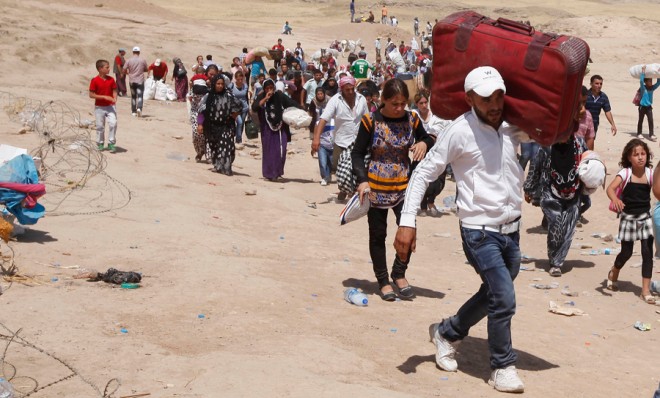How the world is failing Syria's 2 million refugees
Every 15 seconds, someone flees Syria. And they don't have a lot of great options on where to go.

A free daily email with the biggest news stories of the day – and the best features from TheWeek.com
You are now subscribed
Your newsletter sign-up was successful
Every day the president spends trying to rally support in Congress for a military strike against Syria, an average of 5,000 refugees will flee the country, according to the United Nations High Commissioner for Refugees (UNHCR). That is about one person every 15 seconds.
On Tuesday, the UNHCR announced that 2 million Syrians had become refugees due to the violence of the last two and a half years, a staggering jump from 230,670 a year ago. Around half of them are believed to be children, and three quarters of those are under the age of 11.
Those estimates might even be too low. Pete Garratt, disaster manager for the British Red Cross, told CNN, "The true figure is likely to be higher," as many refugees don't register because "they may be afraid of any form of authority."
The Week
Escape your echo chamber. Get the facts behind the news, plus analysis from multiple perspectives.

Sign up for The Week's Free Newsletters
From our morning news briefing to a weekly Good News Newsletter, get the best of The Week delivered directly to your inbox.
From our morning news briefing to a weekly Good News Newsletter, get the best of The Week delivered directly to your inbox.
Their five main destinations, in order of the number of refugees accepted: Lebanon (716,000), Jordan (515,000), Turkey (460,000), Iraq (168,000), and Egypt (110,000).
Many of these refugees live in large camps run by the UNHCR like Za'atari, in Jordan, which jumped from a population of a few hundred in July 2012 to more than 120,000 today. While safer than the frontlines, the UNHCR's own self-evaluation found the camp to be "lawless in many ways" with organized crime rampant and resources "constantly stolen or vandalized."
Part of the problem: Humanitarian agencies have only received 47 percent of the funds they were promised to "meet basic refugee needs."
That is putting a lot of economic and political pressure on Syria's five neighbors, which have absorbed 97 percent of the refugees. One Jordanian official told The New Yorker's David Remnick that "the scale of the influx is equivalent to 33 million Canadians or Mexicans entering the United States."
A free daily email with the biggest news stories of the day – and the best features from TheWeek.com
Some camps in Iraq — which is home to 9 percent of the Syrian refugee population but only 6 percent of the humanitarian funding — are so full that people have been turned away, forced to find shelter in nearby cities and towns, or even risk their lives by returning to Syria.
"The lack of funding in northern Iraq is causing unnecessary hardship and is putting the lives of refugees in danger," Rebecca Gang of the International Rescue Committee wrote in The Guardian, noting that refugees on their own often lack access to basic sanitation and health-care services, as well as education for their children.
So what is the solution to the refugee crisis? Sweden is helping alleviate the pressure on Syria's neighbors by becoming the first EU country to offer permanent residency to refugees from the conflict.
Leftist Indian historian and journalist Vijay Prashad argues that other countries in the region should put the politics of the war aside and focus on how to handle the growing influx of refugees, calling for the formation of a Regional Syrian Refugee Crisis Conference where the "practical matters of relief" can be discussed before the conflict is resolved.
In the long run, the lack of funding for humanitarian organizations and the dearth of countries willing to accept Syrian refugees could lead to bigger problems down the road, claimed António Guterres, the U.N. high commissioner for refugees.
"These countries need massive support from the international community to be able to cope with the challenge," he told The New York Times. "If that support does not materialize, the risks of instability in the Middle East will dramatically increase."
Keith Wagstaff is a staff writer at TheWeek.com covering politics and current events. He has previously written for such publications as TIME, Details, VICE, and the Village Voice.
-
 Crisis in Cuba: a ‘golden opportunity’ for Washington?
Crisis in Cuba: a ‘golden opportunity’ for Washington?Talking Point The Trump administration is applying the pressure, and with Latin America swinging to the right, Havana is becoming more ‘politically isolated’
-
 5 thoroughly redacted cartoons about Pam Bondi protecting predators
5 thoroughly redacted cartoons about Pam Bondi protecting predatorsCartoons Artists take on the real victim, types of protection, and more
-
 Palestine Action and the trouble with defining terrorism
Palestine Action and the trouble with defining terrorismIn the Spotlight The issues with proscribing the group ‘became apparent as soon as the police began putting it into practice’